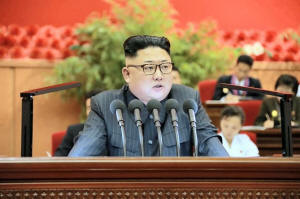|
Tension on the
Korean peninsula has been high this year, beginning with North
Korea's fourth nuclear test in January, which was followed by a
satellite launch, a string of tests of various missiles, and its
fifth and largest nuclear test last month, all in defiance of
international sanctions.
"We reaffirmed the necessity to increase pressure against North
Korea to have it give up its nuclear and missile development and
realise the denuclearization of the peninsula," Sugiyama told
reporters.
He was speaking after a meeting in Tokyo with U.S. Deputy
Secretary of State Antony Blinken and South Korean Deputy
Foreign Minister Lim Sung-nam.
Russia and North Korea's lone major ally, China, have pushed for
a resumption of six-party talks on denuclearization in North
Korea. The talks, which also involve Japan, South Korea and the
United States, have been on hold since 2008.
Lim said his government had decided to resume talks with Japan
for the conclusion of General Security of Military Information
Agreement (GSOMIA), a pact that would share sensitive
information on North Korea's missile and nuclear activities.
The signing of the agreement was expected in 2012, but South
Korea postponed it amid domestic opposition against concluding
such a security pact with Japan, a one-time colonial ruler.
Tokyo's ties with Seoul, plagued by a territorial spat and
Japan's past military aggression, have warmed after reaching a
landmark agreement last December to resolve the issue of Korean
girls and women forced to work in Japan's wartime brothels.
(Reporting by Kiyoshi Takenaka, Nobuhiro Kubo; Editing by Robert
Birsel and Nick Macfie)
[© 2016 Thomson Reuters. All rights
reserved.] Copyright 2016 Reuters. All rights reserved. This material may not be published,
broadcast, rewritten or redistributed.
 |
|






